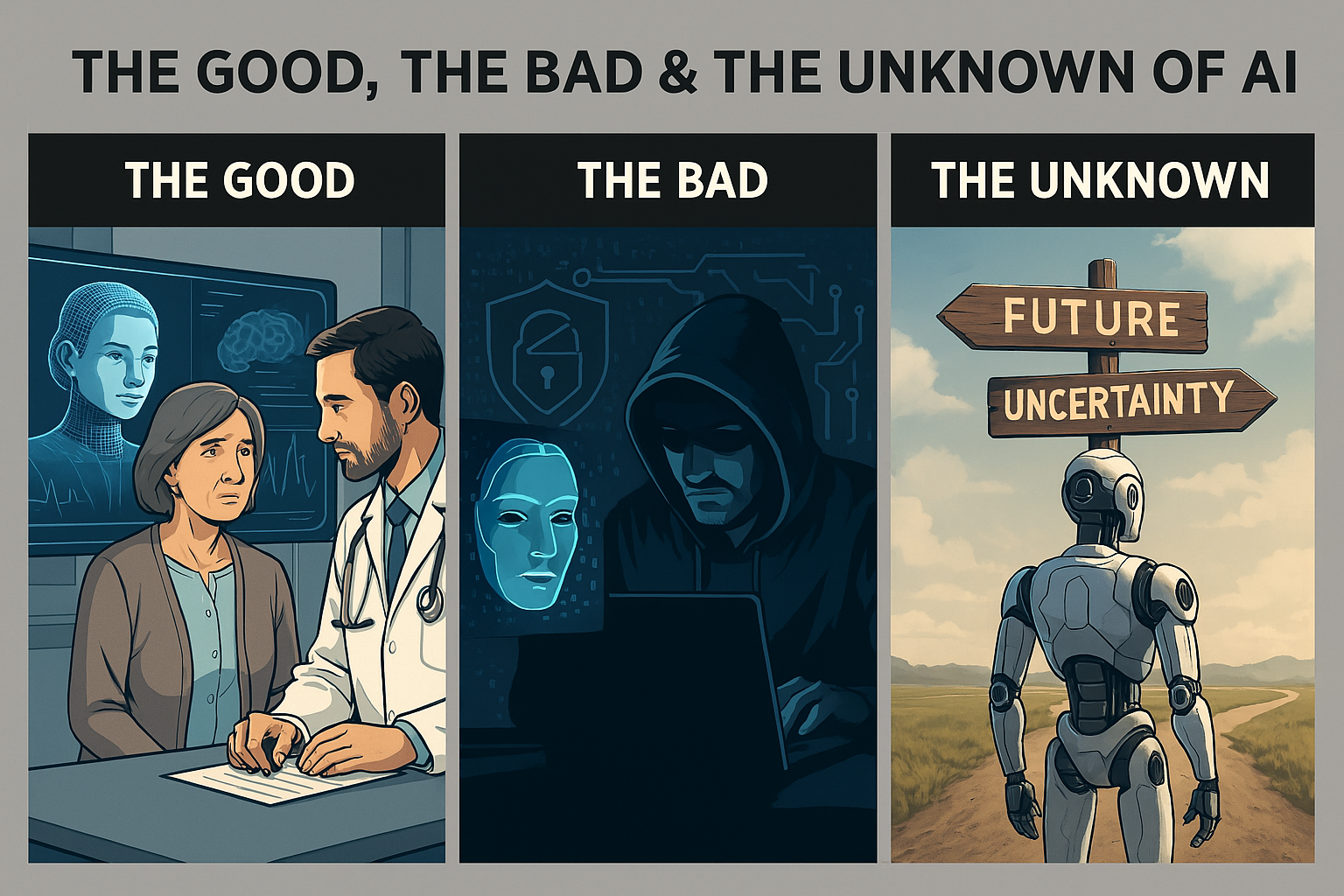Imagine waking up one morning to find that your doctor is an AI, your boss is a robot, and the news you read was written by an algorithm. And it sounds like science fiction, right? Well, it is more real than you realize. Artificial Intelligence (AI) is no longer science fiction—it is here, transforming lives beyond our imagination. But is AI a curse or a time bomb? Let’s take the good, the bad, and the unknown of AI.

The Good: Benefits of AI
Let’s begin on the positive side. AI has revolutionized industries, making processes faster, smarter, and more efficient.
- Automation & Productivity – Artificial Intelligence can be used to replace repetitive and mundane work, free human resources to handle more artistic and strategic roles. Think along the lines of automated assembly, AI-based customer support, and smart assistants like Siri or Alexa. McKinsey predicts that automation with AI is capable of contributing up to a whopping $13 trillion to overall productivity by the year 2030.
- Medical Breakthroughs – AI is revolutionizing healthcare in many ways—especially with advancements in Generative AI in Healthcare. From a disease detection earlier than human doctors to personalized treatments, AI is taking lives. For example, diagnostic platforms with AI have reduced cancer detection errors by up to 10%, according to a research study published in Nature.
- Education & Accessibility – AI-driven learning tools learn how to align students’ needs better, with increased personalized learning. In addition to this, AI-driven speech-to-text capabilities facilitate people with disabilities to utilize the world in an easier manner. A UNESCO report suggests that AI-driven tutoring increases student performance by 30%.
- Data Processing & Decision Making – AI can process vast amounts of data at lightning speed, allowing businesses and researchers to make informed decisions. Banks, for example, use AI to detect fraud, preventing billions of dollars in losses annually.
It’s clear that AI is making life easier in so many ways, but let’s not forget the dark side.
The Bad: Risks & Ethical Concerns
While AI is mighty, it‘s not flawless. There are dangers, and we must confront them before they get away from us.
- Job Displacement – Automation is great for efficiency but not so great for workers who watch their jobs being done by AI. According to the World Economic Forum, AI has the potential to displace 85 million jobs through 2025, but it could also create 97 million new jobs, and that will require a shift in skill sets.
- Bias & Discrimination – AI technology is only as good as what it learns from. Taught by discriminatory data, AI can continue and even amplify discrimination in hiring, policing, and lending. Take Amazon’s AI-driven hiring tool, which was shelved after it was criticized for discriminating against women in favor of men.
- Privacy & Surveillance – Facial recognition and data tracking by AI are intrusive. To whom do our data belong, and what are they used for? Reporting has shown that AI surveillance is present in over 75 countries, raising questions about privacy and human rights.
- Misinformation & Deepfakes – AI-created content is now eerily lifelike. From deepfakes to artificially intelligent news reports, fact vs. fiction has never been trickier to navigate. A study has found that 65% of people cannot tell the difference between text written by an artificial intelligence system and text penned by human writers.
These are heavy concerns, but what of those things we haven’t yet conceived? That‘s where the unknown enters the scene.
Recommended Reading: The Unspoken Rules of Interacting with AI for Safer, Smarter Conversations
The Unknown: What Comes Next?
The destiny of AI is uncertain. There are developments that thrill us, and others that pose questions of existence.
- Superintelligence – Friend or Foe? – Will AI surpass human intelligence? And if so, would it be working for or against us? AI experts like Nick Bostrom feel that once AI becomes superintelligent, it might create goals that are not aligned with human values, and those could lead to unexpected results.
- AI & Creativity – Can AI truly be creative? While AI-generated art and music are impressive, does it understand human emotion, or is it just mimicking patterns? OpenAI’s DALL·E and Google’s MusicLM show that AI can create original artwork and music, but does that count as true creativity?
- Regulation & Control – Governments and technology firms are yet to determine how to regulate AI. There might be too much control suppressing innovation, or not enough leading to chaos. The EU’s draft AI Act seeks to regulate high-risk AI applications, but will it be enough?
- The Impact on Human Identity – If AI dominates more thinking tasks, what does that do to our definition of being “intelligent” or “creative”? Do we redefine what it means to be “intelligent” or “creative” in an age of AI? Psychologists forecast that humans will have to value emotional intelligence and moral reasoning in order to be useful in an age of AI.
Recommended Reading: Novel AI: What Is It, and How Can It Help Your Child?
Final Thoughts: Balancing Innovation & Ethics
AI is not good or bad—it’s a tool, and it will be what we create. As there are great possibilities with AI, we must keep in mind its ethical aspects, biases, and risks. The challenge lies in balancing innovation and responsibility.
So, what do you think—should we regulate AI more, or risk strangling innovation? Have you had surprising experiences with AI in your daily life? Leave a comment below and let’s discuss!
Moonpreneur is on a mission to disrupt traditional education and future-proof the next generation with holistic learning solutions. Its Innovator Program is building tomorrow’s workforce by training students in AI/ML, Robotics, Coding, IoT, and Apps, enabling entrepreneurship through experiential learning.

























